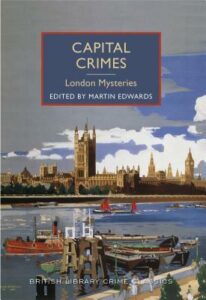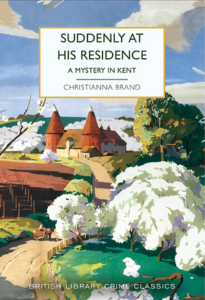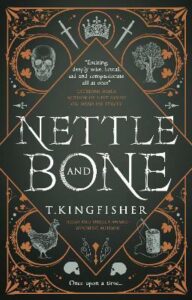Posted July 23, 2023 by Nicky in Reviews / 0 Comments
 Fans: A Journey into the Psychology of Belonging, Michael Bond
Fans: A Journey into the Psychology of Belonging, Michael Bond
Michael Bond discusses fandom with an amount of sympathy that I found a little surprising, since (as a member of multiple fandoms) I’ve experienced a fair bit of hostility to that type/level of nerdery. Even when it comes to furries and otherkin, the tone is sympathetic, and he honours their identities by referring to them in the way they want to be referred to.
Nothing in this book was terribly surprising to me, nor did it really constitute a description of rigorous research — it comes out more like a collection of fandom-related anecdotes and explanations, highlighting the experiences of some fans and describing what fandom can be like (e.g. Jane Austen fandom, or Michael Jackson fandom). It touches on some dark stuff, like being a fan of Michael Jackson despite the accusations made against him, and especially the stuff about fans of serial killers and mass murderers… but it maintains a pretty light, non-judgemental tone.
It basically mildly puts across the message that fandom is enriching for many people, even restorative, and can help you find your “people”. I think most fans could tell you that!
Rating: 3/5
Tags: book reviews, books, Michael Bond, non-fiction
Posted July 21, 2023 by Nicky in Reviews / 0 Comments
 A Christmas Hex, Jordan L. Hawk
A Christmas Hex, Jordan L. Hawk
It’s probably the wrong time of year to read A Christmas Hex, but I was curious about this one and decided to go ahead anyway. Unlike the other Hexworld books, this one doesn’t concern the police and their familiars, but a private detective, Gus. Roland realises that Gus is his witch and quickly becomes fascinated, but he’s terrified to admit that his animal form is that of a wolf, since people normally fear wolves.
It’s a fun set-up, but the relationship between the two feels more than a little rushed by the amount of space available in such a short narrative, and I didn’t get the usual sense of two people figuring out how to match up their experiences and come to some kind of accord. It all feels like it’s a bit too easy, but not in the sort of way where it makes total sense — like there’s some important scenes of negotiation or reaction or something skipped.
It was a fun short read, but definitely not a favourite.
Rating: 3/5
Tags: book reviews, books, Jordan L. Hawk, mystery, romance, SF/F
Posted July 19, 2023 by Nicky in Reviews / 0 Comments
 A History of Reading, Steven Roger Fischer
A History of Reading, Steven Roger Fischer
A History of Reading is an interesting look at reading throughout history. It’s not just the history of books, or stories, but about the place that literacy has generally in society, and a bit of what that meant for society — e.g. how it affects things as reading spreads away from the elite.
Some of the suggestions it has about ereading are very of its time: in reality, our ebooks have been very like our pbooks, without the wild branching of possibilities and jumping around in texts that the author suggests may come next. Likewise, pbooks don’t seem to be going away at the rate people expected back then: we’re all still very fond of our codices.
Still, on the historical stuff it’s fascinating, if a bit slow.
Rating: 3/5
Tags: book reviews, books, history, non-fiction, Steven Roger Fischer
Posted July 17, 2023 by Nicky in Reviews / 0 Comments
 Spectr Volume 2, Jordan L. Hawk
Spectr Volume 2, Jordan L. Hawk
Summoner of Storms concludes volume 2 of these books, so it’s a good point to step back and think about the story so far as a whole. A lot has changed in the last three books, and the status quo is well and truly shattered: things and people aren’t as we thought they were, and Caleb, Gray and John’s relationship has grown.
There’s a lot of good development in these three books, looked at from the end — each individual book might feel pretty short, but together it really builds up. A certain betrayal, and the aftermath of that for several key relationships; the wider plot with SPECTR and what they’re up to; what Gray is and what he can do. I enjoyed that the betrayal wasn’t all someone being an asshole: it makes sense for the characters and their motivations, and all the things they’ve experienced.
The only thing I didn’t enjoy much was the jealousy subplot in the first book of this volume (so book four of the series). I feel like Hawk has leaned on this a bit too much in a bunch of books; it’s very human, but it’s not of interest to me personally.
I’m pretty happy with where the series gets to by this point: each book within this volume advanced things and changed things, and now Caleb, Gray and John are in a whole new world. I’ll be fascinated to see where it goes.
Rating: 4/5
Tags: book reviews, books, Jordan L. Hawk, romance, SF/F
Posted July 16, 2023 by Nicky in Reviews / 0 Comments
 Capital Crimes, ed. Martin Edwards
Capital Crimes, ed. Martin Edwards
This is an interesting bunch of stories, loosely connected by location, but somehow mostly hitting the same notes — I guess people felt a certain kind of way about London, and that comes through in this collection with a serious sense of unease about the way you can meet just about anyone in London.
The inclusion of Berkeley’s original short story on which he based The Poisoned Chocolates Case was an interesting one; the details seemed very much the same, and I can’t really remember how the novel turns out differently and which characters exactly get suspected there. It makes me a little tempted to reread it!
The truncation of the story set on the Underground feels a little odd — I guess it was long/rambling, but still, it feels like a key bit gets missed out here, the whole solution of the thing.
Overall, an interesting collection as usual.
Rating: 4/5
Tags: book reviews, books, British Library Crime Classics, crime, mystery
Posted July 11, 2023 by Nicky in Reviews / 0 Comments
 Spectr: Volume 1, Jordan L. Hawk
Spectr: Volume 1, Jordan L. Hawk
Reaper of Souls closes the first volume of the Spectr series, so now that I’ve finished it, it seems like an appropriate moment to take a look around and try to review the series so far. Volume one is on a strict timeline: Caleb has been possessed by a drakul, Gray. If Gray can be exorcised before 40 days are up, Caleb can go back to his life. If he can’t, well… there’s normally no hope for a human host/victim after that point. John is an agent with Spectr, and he’s meant to be pretty darn good, but he can’t get Gray out.
As a result, and due to Gray’s unique circumstances (he hunts other paranormal entities, not humans; his possession of Caleb is an accident), John ends up babysitting Caleb while he tries to figure out how to exorcise him — and then Caleb ends up helping him with cases using Gray’s strength and supernatural senses, and then Caleb and John start falling in love.
I enjoyed the ambivalence surrounding Gray — the fact that he seems to care about not harming Caleb, not causing too much trouble, and especially his curiosity about John. John’s confused feelings about both of them add another dimension as well, one that becomes increasingly important toward the end of the volume.
I’m looking forward to reading the second volume and learning how everything shakes out.
Rating: 3/5
Tags: book reviews, books, Jordan L. Hawk, mystery, romance, SF/F
Posted July 9, 2023 by Nicky in Reviews / 0 Comments
 The Secret Lives of Country Gentlemen, KJ Charles
The Secret Lives of Country Gentlemen, KJ Charles
I’m pretty much committed to reading whatever KJ Charles writes, and she can pretty much always (with one notable exception) win me over. (The exception is Jackdaw. I wonder if that’ll change when I reread it, but I really didn’t love where the relationship started there, and especially not the tricky middle.) So I started this expecting a good time, and wasn’t too surprised to get it, because it’s KJ Charles.
Admittedly, for a bit I wasn’t sure because Gareth was being a bit of a dick — though as ever with KJ Charles’ characters, you can also see why and where it came from (even if you think it’s a bit overblown; human emotions do that). I wasn’t sure how the two of them were going to figure things out, and honestly the first bit was more fraught than I was looking for in a weird mood.
Still, I gave it time, and quickly found myself sucked in. Gareth has his insecurities, but he also has the strength of them: he knows why he’s insecure, and he doesn’t want to see anyone else feel the same way. Joss has a lot of responsibility and steps up to it with ease, and it’s a delight to see him also learn to share his burdens and to take a little for himself. There are some delightful side characters, too (and some vivid, well-drawn but less delightful ones as well).
The mystery is equal billing with the romance — I didn’t find anything too surprising in how it worked out, but I enjoyed the ride.
Rating: 4/5
Tags: book reviews, books, K.J. Charles, mystery, romance
Posted July 7, 2023 by Nicky in Reviews / 2 Comments
 Hidden Heritage: Rediscovering Britain’s Lost Love of the Orient, Fatima Manji
Hidden Heritage: Rediscovering Britain’s Lost Love of the Orient, Fatima Manji
Hidden Heritage attempts to bring some hidden gems to life, along with their history and context. It’s not just a game of spotting bits of ‘Oriental’ architecture and influence in Britain, but digging into what they meant at the time and what they might mean now. Much of it was new to me — not necessarily surprising, because I knew these influences existed, but new to me in the specifics, in someone actually bothering to point them out.
Fatima Manji’s writing is clear and easy to read in and of itself, but I especially enjoyed getting to read some bits of history that we’re usually less aware of.
Note: the book uses the term “Oriental”, even though it conflates a whole bunch of different cultures, because that’s how it was perceived at the time, and those cultures were conflated and viewed as one (or at least, as very, very closely related), and thus must be understood in that context.
Rating: 4/5
Tags: book reviews, books, Fatima Manji, history, non-fiction
Posted July 4, 2023 by Nicky in Reviews / 0 Comments
 Suddenly At His Residence, Christianna Brand
Suddenly At His Residence, Christianna Brand
There’s something a little same-y about Brand’s writing, particularly between this book and Green for Danger. There are similarities in setup (the small group of suspects), the ingenious plotting to hide the crime, the interactions of the characters as they each blame and suspect the others, and of course the method of detection. Although you couldn’t map the characters one-to-one as being similar, I feel like I’d know this was one of Brand’s books. That makes sense to some degree — after all, it’s the same detective — but it produced such a similar tone and story arc that it felt a little strange to me.
One thing Brand was undeniably good at is ratcheting up the tension for the reader. So many accusations, so many jagged little edges of wounds and half-healed jealousies… and someone in the group is a killer; someone in the group is allowing the others to be suspected.
Like Green for Danger, this isn’t the most comfortable cosy read as a result. I think I liked it more, though — I got a little more interested in the characters and which of them did the crime. The ending of this is pretty harrowing, in a whole different way to Green for Danger. As there, justice is ultimately served, but not through a trial and due process; that is one of the major tropes of Golden Age crime that gives me very iffy feelings.
Rating: 3/5
Tags: book reviews, books, British Library Crime Classics, Christianna Brand, crime, mystery
Posted July 2, 2023 by Nicky in Reviews / 1 Comment
 Nettle & Bone, T. Kingfisher
Nettle & Bone, T. Kingfisher
I really, really loved Nettle & Bone, and found myself repeatedly picking it up and reading more than I intended. It’s a fairytale of a sort, but one that admits its own darkness, and one which comments on itself and the genre as it goes along. Marra is a fun character: not always very aware of how others are feeling and thinking, not always even particularly quick to understand it herself — but kind, and committed to the course of action she’s chosen.
The supporting characters are great, too — the dust-wife and her chicken in particular, of course, and all the humour that her dialogue brings out — and the world around them. The little details like the saints, and the curse child, and the details of the goblin market.
I wasn’t kidding though about the bits of darkness: check for content warnings, if you think there’s something you might be sensitive about. I’ll keep it to the most obvious one, there’s spousal abuse, miscarriage and the death of a child.
Rating: 5/5
Tags: book reviews, books, SF/F, T. Kingfisher
 Fans: A Journey into the Psychology of Belonging, Michael Bond
Fans: A Journey into the Psychology of Belonging, Michael Bond








